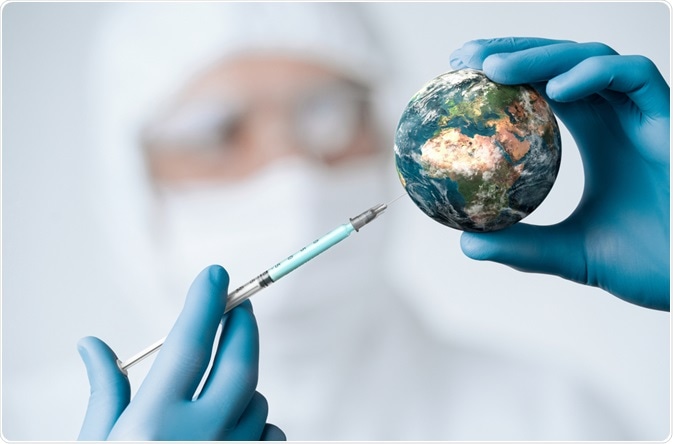Since the World Health Organization (WHO) declared the COVID-19 outbreak a pandemic back in March 2020, the virus has claimed more than 2.5 million lives globally with upwards of 113 million cases being confirmed by laboratory tests (March 2021).
The pandemic has impacted almost every corner of life, causing global economies to stall, changing the way we work and interact with our loved ones, and stretching healthcare systems to the limit. Governments around the world have been forced to implement harsh restrictions on human activity to curb the spread of the virus.
 Image Credit: rangizzz / Shutterstock.com
Image Credit: rangizzz / Shutterstock.com
COVID-19 vaccination is now offering a way to transition out of this phase of the pandemic. Without them, many scientists believe that natural herd immunity would not have been sufficient to restore society to its normal status quo and that it would have resulted in extreme fatality. This is something that has been echoed by many health organizations including the WHO. In a scenario without access to vaccines, strict behavioral measures may have had to remain for the foreseeable future.
Fortunately, the beginning of 2021 saw numerous vaccines given emergency approval and begin their roll out in countries across the world. As of March 2021, just shy of 300 million vaccine doses had been administered worldwide. The figures give hope of a return to ‘normal’. However, global COVID-19 vaccination faces several challenges which may impact its success.
Efficacy of COVID-19 vaccination
Currently, a total of seven COVID-19 vaccines available across three platforms have been approved and are being rolled out across the globe. However, some question the efficacy of these vaccines, especially given the emergence of new strains of the virus. Vaccines must be effective at significantly reducing the spread of the virus for them to be successful.
Research has demonstrated that the Moderna and the mRNA-based Pfizer vaccines are 94-95% effective, and these figures have proven true even in trials studying those at high risk and the elderly.
It is a common misconception that this means 95% who get the vaccine are protected from the disease, leaving 5% unprotected. If this were true, in a population of 100,000 were vaccinated this would lead to 5,000 people contracting the virus and developing the disease over three months. This rate is similar to the current UK COVID-19 case rate.
The 95% effectiveness actually means that people with the vaccine have a 95% lower risk of COVID-19 when compared to a control group. Without the vaccine, we would expect roughly 1% of the population to get the disease, and with the vaccine, this reduces to 0.05%. At such low rates, the vaccines will allow society to get back to ‘normal’ and for restrictions to be permanently eased.
Evolution of SARS-CoV-2 virus
While the current vaccines have proven to be highly effective against the novel severe acute respiratory syndrome coronavirus 2 (SARS-CoV-2) strain that has caused the pandemic, recent data has highlighted the emergence of several mutational strains. There has been uncertainty as to whether the current vaccines will protect against these variants.
Recently, the WHO has eased concerns, stating that current vaccinations have at least some protection against new variants. They also stress that data is being collected and analyzed on new variants, and as our knowledge grows, as will our ability to modify the already approved vaccines to be more effective against emerging variants. As more data is collected, researchers will understand how to amend the current COVID-19 vaccinations so that in the future, to protect against the various strains, booster shots may be administered to maintain the level of protection required to curb the spread of the virus.
What is clear is that it is necessary to achieve herd immunity through vaccination globally in order to prevent SARS-CoV-2 from continuing to mutate, becoming more resistant to current vaccines and causing more periods of mass fatality.
Production, affordability, and allocation of COVID-19 vaccinations
One challenge that has been increasingly discussed is that of offering the vaccine to those who need it most and preventing disparities in vaccination access. Some research is showing that those in well-off regions are more likely to have access to vaccination, with those in poorer communities at greater risk of having less accessibility. For the vaccines to work to the highest of their ability, access should not be dictated by wealth. Ideally, those at high-risk should be vaccinated first, as they are doing in the UK, with less vulnerable groups receiving their vaccine last.
The world needs more doses of the COVID-19 vaccine than it ever has for any disease in history. This, therefore, requires significant production efforts to ensure that needs are met. While the vaccine itself is effective, its impact will be compromised if not enough doses can be produced in a timely fashion.
Fortunately, COVID-19 vaccinations have not suffered from underinvestment like so many others and this investment looks likely to continue to support the need for modified vaccines that address the newer COVID-19 variants.
Public opinion of COVID-19 vaccination
One major potential barrier to the success of COVID-19 vaccinations is a negative public opinion of the vaccine. A June 2020 survey found that 71.5% of people would be very or somewhat likely to take a COVID-19 vaccine, leaving almost a third less accepting of the vaccine. If significant portions of the population were to reject the vaccine, this could have a serious impact on the vaccine’s potential efficacy at controlling the spread of COVID-19. Some populations, in particular, have low acceptance rates; in Russia, for example, less than 55% of those surveyed would accept the vaccine.
This challenge can be overcome by educating the public about the importance of COVID-19 vaccination and being transparent about the development of the vaccine along with the prevalence of potential adverse events. Educating people helps to build trust in the decision to offer vaccinations, without which, the world will not be able to overcome the pandemic and return to ‘normal’ life.
References
- Annavajhala, M., Mohri, H., Zucker, J., Sheng, Z., Wang, P., Gomez-Simmonds, A., Ho, D. and Uhlemann, A., 2021. A Novel SARS-CoV-2 Variant of Concern, B.1.526, Identified in New York. https://www.medrxiv.org/content/10.1101/2021.02.23.21252259v1
- Lazarus, J., Ratzan, S., Palayew, A., Gostin, L., Larson, H., Rabin, K., Kimball, S. and El-Mohandes, A., 2020. A global survey of potential acceptance of a COVID-19 vaccine. Nature Medicine, 27(2), pp.225-228. https://www.nature.com/articles/s41591-020-1124-9
- Mahase, E., 2021. Covid-19: Where are we on vaccines and variants?. BMJ, p.n597. https://www.bmj.com/content/372/bmj.n597
- Olliaro, P., 2021. What does 95% COVID-19 vaccine efficacy really mean?. The Lancet Infectious Diseases,. https://www.thelancet.com/journals/laninf/article/PIIS1473-3099(21)00075-X/fulltext
Further Reading
- All Coronavirus Disease COVID-19 Content
- What is Convalescent Plasma?
- The Cardiac Implications of COVID-19
- COVID-19 and Diabetes
- COVID-19 and Pregnancy
Last Updated: Mar 11, 2021

Written by
Sarah Moore
After studying Psychology and then Neuroscience, Sarah quickly found her enjoyment for researching and writing research papers; turning to a passion to connect ideas with people through writing.
Source: Read Full Article
